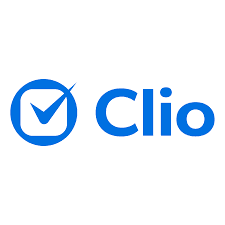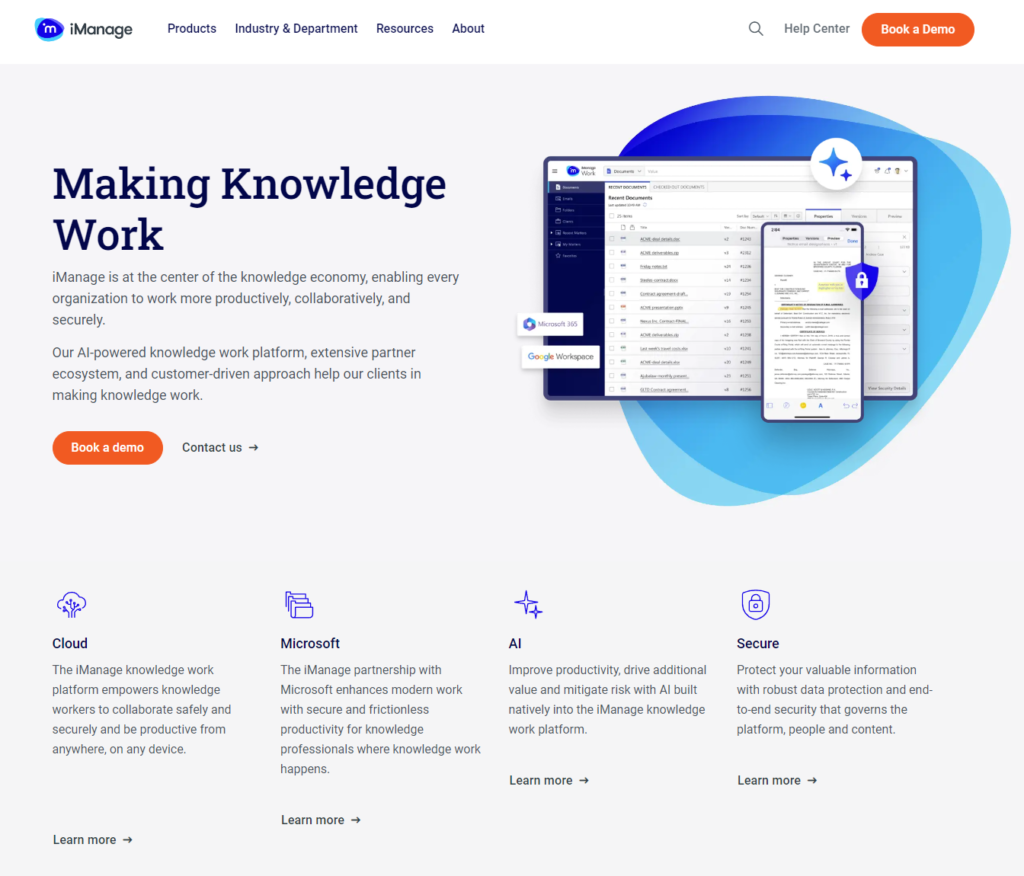In the competitive landscape of document management systems, Clio and iManage Work stand out as prominent tools, each offering specialized capabilities tailored to professional environments. This comprehensive comparison is designed to guide you through choosing the right platform, focusing on features, usability, and integration capabilities that matter most to businesses today.
Clio | iManage Work |
|---|---|
| G2 Score – 4.6 out of 5 stars | G2 Score – 4.3 out of 5 stars |
| TrustRadius Score – 7/10 | TrustRadius Score – 8.4/10 |
Document Handling and Organization
Efficient document handling and organization are critical for any business, particularly in sectors like legal and corporate services where document accuracy and accessibility directly impact daily operations. Let’s explore how Clio and iManage Work address these needs.
Clio: Optimized for Legal Document Management
Clio is tailored specifically for the legal industry, focusing on managing case-related documents efficiently. Its system allows lawyers to organize documents by case or client, enabling easy retrieval and systematic tracking of all paperwork involved in legal processes. This feature is crucial for law practices where associating documents with specific cases, clients, or other legal matters is a daily necessity.
Furthermore, Clio provides robust cloud-based access, which means documents are available anywhere, anytime, provided there’s internet connectivity. This accessibility proves invaluable for lawyers who need to work on their cases remotely or access documents during court sessions. Additionally, Clio supports version control, ensuring that the most current document versions are always at hand, reducing errors and improving overall case management.
iManage Work: Comprehensive Solution for Multiple Industries
Unlike Clio, which focuses on the legal sector, iManage Work caters to a broader range of professional services, including law firms, financial institutions, and corporate legal departments. iManage Work excels in handling large volumes of documents through its powerful search functionality and sophisticated organizational taxonomy. It allows users to categorize documents extensively based on multiple metadata attributes, making it easier to retrieve specific documents quickly.
iManage Work also features advanced document version control and check-in/check-out functionality, which is essential in environments where multiple stakeholders frequently collaborate on documents. These features ensure that edits are tracked meticulously, and document integrity is maintained across all stages of project development or legal casework.
Security and Compliance
In any industry where sensitive documents are handled regularly, robust security measures and strict compliance with regulatory standards are crucial. Let’s delve into how Clio and iManage Work ensure the security of your documents and maintain compliance with legal standards.
Clio: Secure and Compliant Legal Document Management
Clio places a high priority on security, especially given the sensitive nature of legal documents. It employs industry-standard encryption protocols both in transit and at rest to secure client data against unauthorized access. This commitment to security is paired with compliance with key legal standards such as GDPR for European clients and state-specific regulations that affect law firms in the United States.
Clio also features comprehensive permission settings that allow firm administrators to control who can view or edit certain documents or case files. This granularity not only enhances security but also ensures that internal controls and compliance with client confidentiality agreements are upheld.
Moreover, Clio’s cloud-based infrastructure allows for regular updates and patches, ensuring that the system’s security measures are always up to date. This proactive approach to security management helps safeguard sensitive information from emerging threats and vulnerabilities.
iManage Work: Advanced Security for Diverse Professional Environments
iManage Work offers a slightly different approach tailored to its broader client base, which includes law firms, financial institutions, and corporate legal teams. It boasts an advanced security framework that includes need-to-know security, which ensures that information is accessible only to authorized individuals who require it for their work.
This system supports detailed compliance with industry-specific regulations such as HIPAA for healthcare-related documents and SEC regulations for financial institutions. iManage Work also provides exceptional data governance capabilities that help organizations manage data retention policies effectively, an essential feature for compliance with legal holds and audit trails.
The platform uses machine learning algorithms to monitor and detect unusual access patterns or potential breaches, offering an additional layer of security by proactively identifying and mitigating risks before they can impact the organization.

Related: Check out our free SEO suite

Integration Capabilities
The ability of a document management system to integrate seamlessly with other business applications is a critical aspect that can significantly enhance workflow efficiency and data consistency. Let’s evaluate the integration capabilities of Clio and iManage Work to see how well they connect with other tools and systems.
Clio: Seamless Integration with Legal and General Business Tools
Clio offers a wide range of integrations designed specifically to enhance the productivity of legal professionals. It integrates seamlessly with many commonly used legal applications, including time tracking and billing software, e-discovery tools, and legal research platforms. This integration extends to general business tools such as Google Workspace, Microsoft Office 365, and various accounting software like QuickBooks and Xero, facilitating a unified workflow that reduces manual data entry and potential errors.
Furthermore, Clio leverages its API to allow for custom integrations, enabling law firms to tailor the system to their specific needs and connect with niche tools that may be unique to their practice. This flexibility ensures that Clio can adapt to the evolving needs of a dynamic legal environment, supporting firms as they grow and their technology needs become more complex.
iManage Work: Extensive Integration Across Professional Services
iManage Work also boasts robust integration capabilities but with a focus that extends beyond the legal industry to include financial services, real estate, and other sectors where document management plays a critical role. It integrates effectively with major enterprise content management systems, ERP systems, and professional email platforms, ensuring that documents and communications are easily accessible within the context of broader business processes.
iManage Work’s integration with advanced AI and machine learning tools stands out, enhancing features like document tagging, search, and compliance checks. These integrations help automate routine tasks, improve document searchability, and ensure compliance across all documents, significantly boosting productivity and mitigating risk.
User Experience and Customer Support
User experience and customer support are crucial aspects of any software platform, influencing both the effectiveness of the tool and the satisfaction of its users. Let’s examine how Clio and iManage Work perform in these areas to help you make a well-informed decision.
Clio: User-Friendly Interface with Robust Support
Clio is renowned for its intuitive user interface, designed specifically with the needs of legal professionals in mind. This focus on user experience ensures that lawyers and their staff can quickly adapt to using Clio without significant training or disruption to their workflow. The platform’s design simplifies the management of legal cases and documents, making critical information readily accessible and easy to manage.
In terms of customer support, Clio offers extensive assistance to ensure users can make the most of the platform. Support is available through multiple channels including live chat, phone, and email, providing users with the flexibility to choose the method that best suits their preferences. Additionally, Clio provides a comprehensive online resource center that includes training videos, detailed articles, and a community forum where users can share tips and seek advice from peers.
iManage Work: Tailored for Professional Use with Dedicated Support
iManage Work also offers an excellent user experience, particularly praised for its ability to handle complex document management needs across various industries. The interface is designed to be user-friendly while providing powerful functionality, such as advanced search capabilities and intelligent document tagging, which enhance productivity and reduce the time spent managing documents.
Customer support at iManage Work is similarly robust, tailored to meet the needs of professional services firms. The support team is equipped to handle complex inquiries related to enterprise-level document management, offering specialized knowledge that can help resolve issues more efficiently. iManage Work also offers training programs and detailed documentation to help new users become proficient with the system, ensuring firms can leverage the full power of the platform.
Pricing Models
Understanding the pricing models of document management systems is crucial, as it affects both initial adoption and long-term viability for businesses. Let’s dive into how Clio and iManage Work structure their pricing to help you determine which system might offer better cost-effectiveness for your organizational needs.
Clio: Transparent Pricing Tailored to Law Firms

Clio offers a clear, tiered pricing model that is designed to accommodate law firms of different sizes and needs. The tiers range from a basic plan, which includes essential document management and case management features, to more comprehensive plans that incorporate additional functionalities like advanced reporting, priority support, and increased data storage. This flexibility allows law firms to select a plan that matches their specific requirements without paying for unnecessary features.
Clio’s pricing structure is also beneficial for small to medium-sized law firms as it allows them to start with a more basic setup and scale up as their needs grow. Additionally, Clio often provides promotional rates and discounts for longer-term commitments, which can further enhance its affordability and appeal to budget-conscious firms.
iManage Work: Customized Pricing for Diverse Needs

iManage Work approaches pricing differently, offering customized plans that are tailored to the specific needs of each client, particularly targeting large organizations and various professional sectors beyond just legal. Pricing is typically based on factors like the number of users, the level of customization required, and the specific features needed for each organization’s document management processes.
This customized approach ensures that businesses pay for exactly what they need, which can be a cost-effective solution for large enterprises or organizations with complex requirements. However, it might be less transparent and predictable compared to Clio’s tiered pricing, which could be a consideration for businesses planning their budgets.
Conclusion
When it comes to selecting a document management system, both Clio and iManage Work offer robust capabilities, but they cater to distinct types of users and business needs.
Clio is specifically designed for the legal industry, providing law firms with an intuitive, user-friendly platform that integrates seamlessly with legal workflows. Its tiered pricing model is clear and predictable, making it a great choice for law firms of all sizes, particularly those looking for a system that can scale with their growth. Clio excels in document management, case management, and client relations, with a strong focus on enhancing the efficiency and productivity of legal practices.
iManage Work, on the other hand, offers a more versatile solution suitable for various professional sectors, including legal, financial, and corporate enterprises. Its strength lies in handling complex document workflows and integrating with a wide range of enterprise systems, making it ideal for large organizations or those with sophisticated document management needs. iManage Work’s customized pricing ensures that each organization gets a tailored solution that fits its specific requirements, although it may come at a higher cost.
Read Next:
- GetResponse vs Zoho Campaigns: The Best Email Marketing Tool for 2024
- AWeber vs ActiveCampaign: The Best Email Marketing Tool
- Constant Contact vs Campaigner: Best Email Marketing Tool
- GetResponse vs Omnisend: The Best Email Marketing Tool for 2024
- AWeber vs Benchmark Email: The Best Email Marketing Tool





















